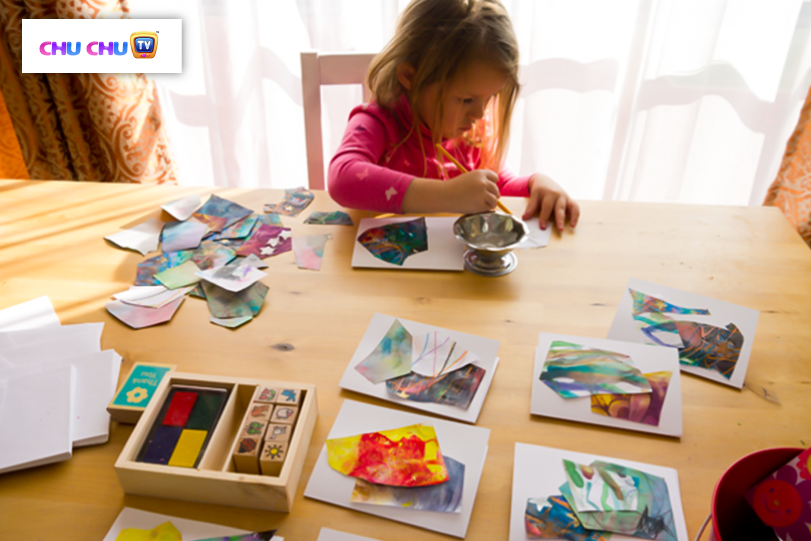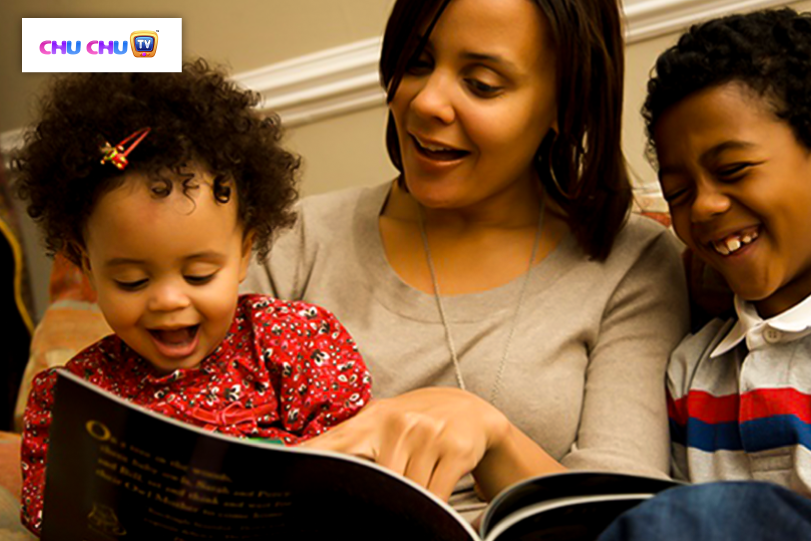Do you often have a dream in my head on how you want your child to grow up to be? Every parent indulges in this fantasy once in a while. Although as parents, we are only facilitators in their journey of life, we can make a world of difference in the kind of values we imbibe in them from a young age.
Kindness as a trait is considered soft and compromising but research shows that it contributes to greater happiness, better networking and more meaningful relationships. The world has moved from the model of Intelligence Quotient to Emotional Intelligence which places a great deal of emphasis on empathy. Empathy is possible only when the mind is open and kind. So how do you foster the spirit of kindness in your children? Read on to find out.
1. Thinking Hat
 When you find a situation in which your baby is battling between doing what she wants to do versus being kind to another person, ask your child to think of the other person’s shoes. Encourage them to visualize how the opposite person’s thoughts work. This will automatically make them assess the situation with another perspective making them empathetic to their friend. If the conflict still remains, do not force them to follow any option. Instead, allow them to do what they want and then spend a quiet few minutes to reflect on how it made your child feel. Over time, thinking of what other people may want or need will become a habit in your little one which is the foundation for being kind.
When you find a situation in which your baby is battling between doing what she wants to do versus being kind to another person, ask your child to think of the other person’s shoes. Encourage them to visualize how the opposite person’s thoughts work. This will automatically make them assess the situation with another perspective making them empathetic to their friend. If the conflict still remains, do not force them to follow any option. Instead, allow them to do what they want and then spend a quiet few minutes to reflect on how it made your child feel. Over time, thinking of what other people may want or need will become a habit in your little one which is the foundation for being kind.
2. Set an example
 Be the person you want your baby to be. This is something every parent should carve in stone. Any quality that you try to teach your baby should first be practiced by you in whatever way possible. It is also the simplest way they will pick up the trait without actually resisting it.
Be the person you want your baby to be. This is something every parent should carve in stone. Any quality that you try to teach your baby should first be practiced by you in whatever way possible. It is also the simplest way they will pick up the trait without actually resisting it.
3. Value of something
 Refrain from teaching your child to value or consume something before someone else can. This thought is something many parents indulge in without actually thinking about it. Asking your baby to eat fast otherwise, the cow will eat up the food is actually a way of telling your child that the cow ought not to eat the food. Instead, say that the cow has eaten and that you should too.
Refrain from teaching your child to value or consume something before someone else can. This thought is something many parents indulge in without actually thinking about it. Asking your baby to eat fast otherwise, the cow will eat up the food is actually a way of telling your child that the cow ought not to eat the food. Instead, say that the cow has eaten and that you should too.
4. Hold your tongue
 When in doubt whether what you are about to say is unkind, it is always better to stay quiet. This idea has to be communicated to your baby as they begin to express themselves earnestly on what they want and how they want it. Keeping in mind how the words were spoken will be received by the person in front of them will make them learn to communicate with empathy.
When in doubt whether what you are about to say is unkind, it is always better to stay quiet. This idea has to be communicated to your baby as they begin to express themselves earnestly on what they want and how they want it. Keeping in mind how the words were spoken will be received by the person in front of them will make them learn to communicate with empathy.
5. Good manners
 Teach your child good manners. Insist that they greet elders with a ‘Good morning’ and a smile. Teach them that ‘Thank You’ is not a choice but ought to be expressed at the appropriate times earnestly. Good manners make any atmosphere congenial and set the stage for relationships built on mutual respect and concern. These manners will also teach your kids that regardless of how they feel, they should learn to be congenial and friendly.
Teach your child good manners. Insist that they greet elders with a ‘Good morning’ and a smile. Teach them that ‘Thank You’ is not a choice but ought to be expressed at the appropriate times earnestly. Good manners make any atmosphere congenial and set the stage for relationships built on mutual respect and concern. These manners will also teach your kids that regardless of how they feel, they should learn to be congenial and friendly.
6. Entitlement
 If your baby is the apple of your eye, they do tend to think the world revolves around them. Spoilt children are by definition never too kind to others. Try to teach your baby to value love and affection they receive and that it should be passed around. Plant the idea that everyone deserves care and concern in the world. Also, teach them that everyone should give back to society what they receive as privileges in their life. This sense of social responsibility will keep your baby grounded at all times.
If your baby is the apple of your eye, they do tend to think the world revolves around them. Spoilt children are by definition never too kind to others. Try to teach your baby to value love and affection they receive and that it should be passed around. Plant the idea that everyone deserves care and concern in the world. Also, teach them that everyone should give back to society what they receive as privileges in their life. This sense of social responsibility will keep your baby grounded at all times.
7. Power of empathy
 Most of the work we all do has a lot to do with solving problems for our clients or customers. A large part of the success of that endeavour has to do with how well we can empathize with them. Kindness as a trait leads to empathy. Teach your children that when we attempt to understand someone else’s mind, we end up expanding our emotional horizon. This expansion leads to better EQ and hence more success in life.
Most of the work we all do has a lot to do with solving problems for our clients or customers. A large part of the success of that endeavour has to do with how well we can empathize with them. Kindness as a trait leads to empathy. Teach your children that when we attempt to understand someone else’s mind, we end up expanding our emotional horizon. This expansion leads to better EQ and hence more success in life.
 Another effective way to teach your little one to be kind is to teach them to recognize kindness when they receive it. Practice gratitude in their presence and encourage them to explore their feelings along this thought process. When they realize how happy they feel when someone is kind to them, they may feel encouraged to pass on the magic to others whenever they can.
Another effective way to teach your little one to be kind is to teach them to recognize kindness when they receive it. Practice gratitude in their presence and encourage them to explore their feelings along this thought process. When they realize how happy they feel when someone is kind to them, they may feel encouraged to pass on the magic to others whenever they can.
8. Address needs
 When you address your child’s needs, they mirror that behavior by becoming aware of what needs others have. Cognizance over what someone might need in a given situation is a very empowering quality as it leads to better problem solving which is an essential leadership quality.
When you address your child’s needs, they mirror that behavior by becoming aware of what needs others have. Cognizance over what someone might need in a given situation is a very empowering quality as it leads to better problem solving which is an essential leadership quality.
9. Emotional literacy
 Consciously choose literature that promotes emotional literacy for your baby. Exploring a story at an emotional level calls for greater involvement from the child and better recall. Try to expose them to stories and books that have kindness as a theme like ‘Heidi’ to name a classic. The books you expose your children to have a huge role to play in their value system while growing up.
Consciously choose literature that promotes emotional literacy for your baby. Exploring a story at an emotional level calls for greater involvement from the child and better recall. Try to expose them to stories and books that have kindness as a theme like ‘Heidi’ to name a classic. The books you expose your children to have a huge role to play in their value system while growing up.
10. Raise a pet
 A wonderful way to raise a compassionate and kind child is to have a pet. They automatically learn how to care for someone who can’t voice their preferences. If your circumstances permit you, go ahead and adopt a pet as soon as you can.
A wonderful way to raise a compassionate and kind child is to have a pet. They automatically learn how to care for someone who can’t voice their preferences. If your circumstances permit you, go ahead and adopt a pet as soon as you can.
While kindness is a wonderful quality, like everything else, too much of it may make your child a pushover. So as you teach your child to be kind, also teach them to be firm and assertive when the situation demands it. But more importantly, teach them to identify the instances that demand kindness and the instances that demand them to the firm. Encourage them to explore their feelings and learn from their experiences.










This platform is actually a exciting place for me . Actually as I start on this information I believe I would be making a wonderful kids ND a beautiful family